
Simone Lia
* Location: London
* How would you describe your art?: Absurd, honest and funnyish. Mostly simple drawings and paintings about human relationships.
* Currently working on: A comic story that's a 'period drama'
* Day job: Illustrator
* 3 Likes: laughing, summer, quality (relationships/a job with no corners cut/a good meal etc)
* Dislikes: being worried, filling forms/paperwork
* Daily Inspirations: God. People. Nature.
* People & artists you admire: Charles Shulz, Craig Thompson, Marjane Satrapi
* Favourite album(s) to listen to when working: In the last few months I've been listening loads to Radio 4, I even love the Archers.
http://www.simonelia.com
http://www.cabanonpress.com
- - -
This interview took place at the beginning of June 2006. All images reproduced with permission © Simone Lia / Cabanon Press.
- - -
Hi Simone, how are you? What are you up to at the moment?
Hi there I'm fine thanks. I've been writing a new comic story for a comic book. I've been inspired by classic stories like Great Expectations and The Secret Garden because they really get to the nitty gritty of human behaviour plus they're set in ye olde world times. I wanted to write my own period drama and use characters that I've worked with before - like Chip and Bean and put them in a ye olde setting. Chip and Bean are playing the parts of a footman and a maid - they might do a bit of magic too...I'm not sure yet.
I once read a reviewer claim of your work that ‘the impact of her work isn’t found in the contours of her lines, but in the simplicity in which she’s able to convey the thoughtful and heartfelt’. Coming from a background which saw you study at the Royal College of Art I find it fascinating that you have developed such a simple, powerful style as it is often the case that such institutions and ‘high art’ circles promote and advocate that bigger, better, more complex, and pricier production methods and equipment are employed as a qualifier of art’s ‘worth’. What did art college teach you about, and inform your own style, and sense of ‘the simple’?
Everyone on my course was doing quite different work; I guess that's why we were chosen - because of the variety. Some people were doing conceptual work and using equipment and things but I was quite interested in the title of the course because it was 'communication in art and design'. I was quite keen for my work to communicate to an audience. I'd got into doing simple drawings before going to the RCA, I guess it was from illustrating children's books where you want everything to be clear for a little reader. I learnt about work ethic at the RCA, everyone worked quite hard and they were quite passionate about their work like it was their life. I think it's quite good if you are passionate about what you doing and that there is a reason for the work.
What are your thoughts on your “simple” style of art in terms of accessibility for audiences, and in terms of generating a level of innocence, and thus humanity & heart within your comics?
I have been quite keen for the work to be accessible to an audience that may not necessarily be interested in art. My Mum is a good testing person as she's not interested in art at all and I'm really pleased if she laughs out loud. Another thing that I'm quite interested in is that there is an honesty that the characters have their own thoughts and likes and dislikes and they speak for themselves. I spend a lot of time thinking about the characters before I start to draw them.
One thing that really strikes me within your work is the compelling use of small objects and creatures as narrators or subjects within your work; from spoons to sweet corn kernels, rabbits to onion bhajis, jelly beans to marrows. How important is ‘the everyday’ or ‘the ordinary’ to your work?
I do like everyday and ordinary things. I especially like to draw street scenes and buildings that are quite ordinary because in real life you're kind of blind to the details but once you start drawing these things then you notice that actually the buildings and bus-stops have a beauty. Also, street furniture and shop fronts, for example, are always changing and evolving in some way so a drawing or comic can be a kind of time capsule of a particular time and place, I like that idea. With regards to the marrows and spoons and bhajis etc I use those because sometimes an object or food stuff can communicate more effectively then a drawing of a person would. For example I drew a bunny called Fluffy because I wanted to draw a very sweet and vulnerable child and drawing a bunny conveyed that concept strongly more so than if I drew a small child.
To some degree your use of small, immaterial subjects reminds me of a song by Kimya Dawson, I Like Giants, a song about fear, worry and perspective where she sings about looking up into the sky just to remind herself that she’s really tiny in the grand scheme of things, (a song that is incidentally based upon an illustration, La Geante, by Genevieve Castree). By using such small subjects, (and in stating an influence of nature over your work, especially small creatures like ants), things that are often deemed as insignificant in the grand scheme of things, does it allow you to play-out and depict things (romance, tragedy, pathos, existentialism?) from a pragmatic perspective that feels fresher and more uncluttered than if you were to depict it from the tainted perspective of a larger-than-life human, with all the baggage and entanglements and lack of clear, realistic views that come with that?
Yes. I think if you draw an object for example it doesn't necessarily have a specific gender and that for one thing takes away some baggage of how a reader might relate to that character. With Fluffy (the bunny I mentioned before) I didn't write into the story its gender - a lot of people emailed me to ask whether Fluffy was a boy or a girl. Interestingly the girls said she was a girl and the boys said he was a boy. I think the reader subconsciously finds a way that a character relates to him or herself and looks for similarities.
Similarly, I once read you, in conversation about your children’s book, Billy’s Big Dream, state of the lead character, Billy the Jelly Bean that: ‘I think I wanted something so small and insignificant to have a dream and actually make it happen, quite empowering’. In terms of that book being aimed at an audience of children, how important do you think instilling an element of perspective, and empowerment within your work is, in order to provide encouragement, and promote self-respect and confidence and maybe a clear, positive world-view from an early age, regardless of size or stature?
I would like to provide encouragement in the children's stories but also it would be good if it didn't just stop at children and if books for adults as well could instil an element of perspective somehow. Most of my characters in my adult stories are quite dysfunctional and the way that they relate to each other is often weird or not so good. But I don't think that it would inspire that behaviour in other people. I've recognised myself in some of the characters, been horrified and then tried to do something about changing my bad habits. I would be happy if my work did have a positive effect on readers. In an ideal world it would be good if art in all it's forms did have some knock on positive effect on people, I think the world would look very different. Sometimes though I think artists can put out stuff that tries to be shocking for the sake of it or rub people up the wrong way and I don't really see the point of that, I think it's too easy to do that.
I think your children’s book, Little Giant also works on the flip-side of this feeling of perspective; the lead character, a little girl is frustrated at being the smallest in her family, and thus unable to do things like reach the light switch. She discovers that when she’s in the garden she’s actually bigger than most things, and so begins to feel quite powerful. Instead of working with characters who are small and from this size feel that they can exist with less demands, but with more knowledge and vision of the grand scheme of things and the roles they play, this character appears to innocently want the power and confidence that comes with size. Where did the inspiration for this piece come from? Do you enjoy playing with perspective (and size) in order to create meaning?
I got this idea from nature. I was looking out at the sea and I had one of those moments when you are filled with awe. I thought about how big the sea is and how it had been there for such a long time and would probably be there a long time after I have gone. At that moment I felt very insignificant and small in a good way. Then I looked down near my feet and I could see lots of little rock insects climbing everywhere and they were tiny. At that moment I felt really massive. I wanted to use this idea for a story and came up with Little Giant. I remember the feeling I had when I was small and the frustration, it was a feeling of impatience to grow up. I wanted to show the contrasts to put everything into perspective.
I am very interested in how and where women gain access to their own confidence, and self-belief – especially in terms of how they are able to produce and create their art work with a sense of assurance, belief and certainty. What is your personal relationship with confidence over your work? In terms of what we were discussing above, were your artistic endeavours encouraged from an early age, giving you a sense of perspective over your productivity and its success and worth? Were you encouraged or indeed self-driven in making your dreams of putting your creative ideas into practice, or making your artistic success happen?
I suppose I'm not that confident about what I do, I have the negative voice on a loop about how awful everything is. Sometimes it's useful but usually that negative thing slows me down a lot. I've come to the conclusion that it doesn't go away and also everyone has it to some varying degree and one has to just ignore it otherwise you get depressed. I loved art from the age of 13, I found it a good way to enter into another world for a few hours. I had zero confidence at school but my teachers were so unbelievably encouraging and supportive that it made me think that perhaps I could be an artist. My parents were fine about sending me to art school so it started from there really.
Speaking of success, you once claimed that, ‘having that [success] as a motivation can make one very unhappy indeed because whatever we do we will never be enough’. This statement is one that I think is true of life, not just art, and thus one that is importantly relevant to everybody. How do you personally battle with this?
I guess it depends on what one's idea is about success and also it's a perspective thing again. I could look at my life and all of the things that I haven't done or had failure with and this would make me quite sad. But then I can look at my life and all of the things that are good and be thankful for these things.
I was recently reading about the release of Dr. Fredric Werthan’s book, Seduction of the Innocent in 1954, and how at that time overall interest in comics dwindled since Werthan’s book aimed to prevent comics from entering ‘innocent’ children’s lives. As the writer and illustrator of children’s books, the creator of comics, and as the facilitator of workshops that include book-making for children/parents which help kids work with their own words and pictures to tell their own story, how important do you personally think it is that comics and such creativity enters children’s lives?
I think that children are very creative naturally and we lose that child like wonder as we get older. I'm not familiar with the Seduction of the Innocent but that Dr. Fred has got a lot to answer for!
In setting up the collaborative group, Cabanon Press with artist Tom Gauld has it allowed your comics work a freedom that perhaps would not have come from working with a larger company?
Yes because you can draw what you like and you don't have to worry about lots of people agreeing that it's ok. Working for larger companies has loads and loads of merits but sometimes the legalistic and pc business is over the top and you can end up with a product that is entirely bland. It sometimes is fun just to go a bit crazy with what you do and not have to worry about sticking to limits like page numbers and the content can be very strange.
One of the most inspiring things I have read about setting up our own projects and working independently came from an essay I read in which the following quote appears: ‘a panel of women talked about their experiences of running their small businesses, as well as various other projects. Less concerned with the mechanics of running a business, each woman gave a person narrative of the process of having an idea and turning it into something public. “Just think of something that you want to exist in the world and doesn’t. Then try to make that idea happen.” ’
How important for you in the creation of Cabanon was the aspect of having artistic ideas and wanting them to become public?
I guess with all of the arts you would like to share your creation whether it's with a select or mass audience. In relation to your quote I can relate to that too - if you have an idea to do something with a business or whatever it is a buzz if it actually happens and people get excited and enthused enough about your idea to want to get involved. With Cabanon Press our main incentive was for people to get their mitts on our comics and for them to be lovely objects.
I read writer Sara M. Larsen in a recent interview speak of how her cutting-edge literature is more of a DIY art form. She claimed that ‘publishing outside of the mainstream is imperative if you want to connect with a community of writers [or artists, or readers/viewers] who are doing something that is art, not a product.’ To what degree do you agree with this sentiment about art vs. product, in reference to what you and Tom are doing with Cabanon Press?
Umm. Actually I do refer to my work sometimes as a product to me it just means a finished good that's whole. I make the art and then if it is sent to a printer then it becomes a product because usually it is sold. But in the context that she is speaking of I can understand what she means - I've worked with publishers before who have asked me to knock something out for Christmas. It's all about the money bit and not the art bit.
I find myself laughing out loud at and feeling sorry for your adorable characters in equal parts. Is it easy for you to convey your subtle humour within your comics? How important is humour to you as an artist?
Thanks. I like to have a laugh. I suppose that's an important thing in my relationships and things so it sort of comes out in the work sometimes but not if I try to make it funny, then it's very difficult.
What for you are the most enjoyable, and satisfying aspects of being an artist and creating the work you do?
When it's finished and if it makes someone laugh out loud then that's the best bit.
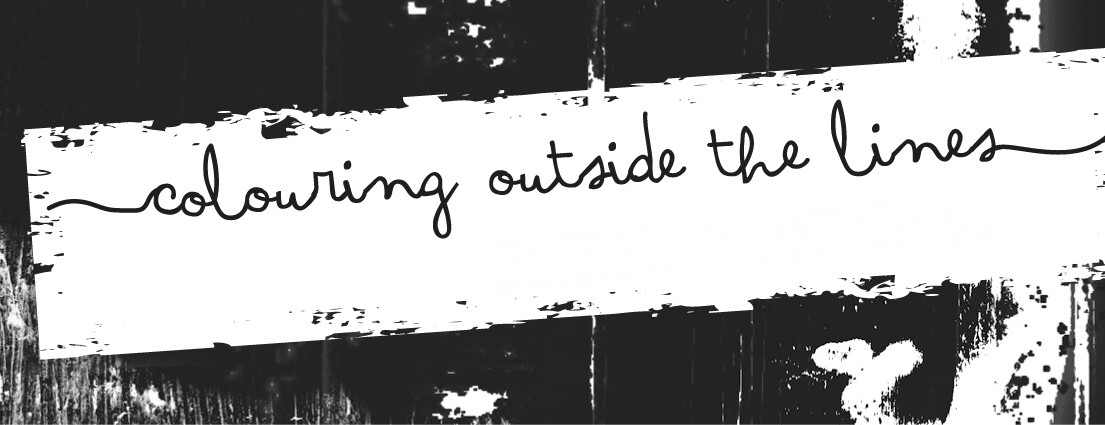





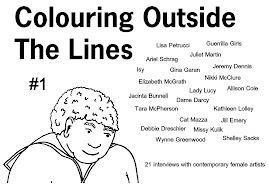
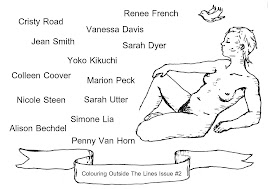

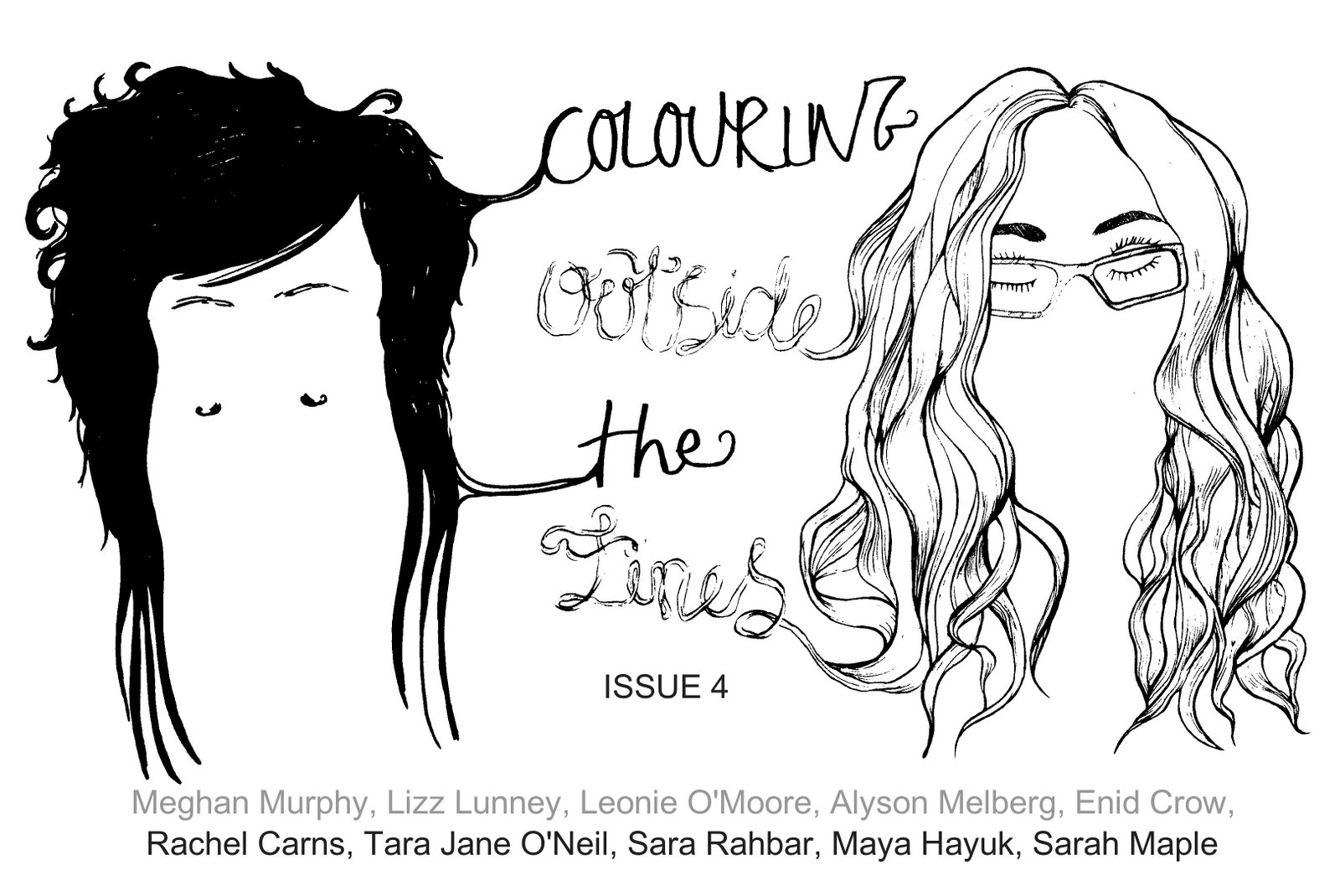

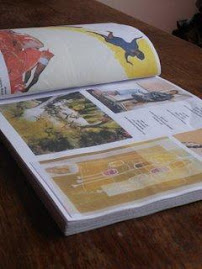



No comments:
Post a Comment